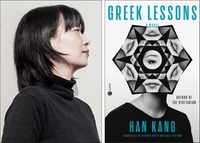The White Book
Han Kang, trans. from the Korean by Deborah Smith. Hogarth, $22 (160p) ISBN 978-0-525-57306-7
Far from a traditional novel in its presentation, the engrossing latest from Man Booker International winner Han (The Vegetarian) fills spare pages with sometimes poetic meditations on the possibilities of a life unlived. After traveling to Warsaw from South Korea and renting an apartment, Han’s unnamed narrator remembers the story of her parents’ first child, a girl who died shortly after birth. The narrator investigates her own grief regarding this child to conjure a possible alternate timeline wherein the baby lived. The narrator looks through the eyes of this new person, wandering the foreign city, observing the snowy season developing around her, and using objects like “Sleet,” “Salt,” and “Sugar cubes” as titles to anchor each section. The narrator crafts an entire life for this lost sister before turning her considerations inward, asking if she would have been conceived if the child had survived. Han breaks her narrative into three parts, “I,” “She,” and “All Whiteness,” and throughout writes with attention to the whiteness of the page. The second section, in particular, is wintery in presentation, with small blocks of black text floating atop swaths of blankness. Though thin on conventional narrative, the novel resonates as a prayer for the departed, and only gains power upon rereading. (Feb.)
Details
Reviewed on: 03/01/2019
Genre: Fiction
Paperback - 160 pages - 978-0-525-57307-4
Audio book sample courtesy of Penguin Random House Audio


